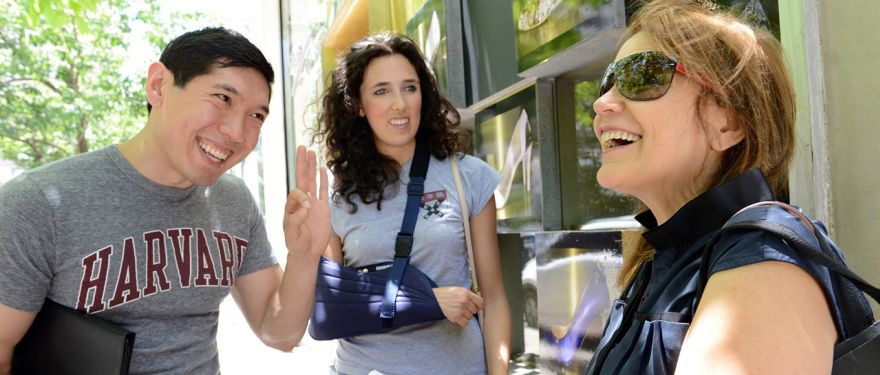Though HBS is based in Boston, the MBA program is
inherently a global experience. Traveling to an emerging market is
part of the first year curriculum, over 70 countries are
represented in of our
diverse student body, and over 50% of cases written by HBS
faculty are international in scope. This month we spoke with
Elizabeth Chertavian (MBA 2015) and Elliott Davis (MBA 2016) to
find out how they’ve broadened their global perspective at HBS both
inside and outside the classroom.
1. Your classmates come from all around the world and will alter the way you think
Elizabeth: One of the things I value the most at HBS is the diversity of my classmates, and the fact that I get to learn from all of them every day. I’ve loved getting to learn about different cultures and experiences in business. I value the fact that we can all get together and discuss and debate ideas and questions. At HBS we are all learning tools that will help us not just in our home country but in a global economy.
Elliott: My section is incredibly diverse and benefits from many unique backgrounds and perspectives, and my section mates have been the most important influences on my international education this year. I look to them for insights into international cases, foreign affairs and US diplomatic interactions. They have fostered in me an “ask first, answer second” approach to learning about their cultures, politics and economies.
2.You'll travel to an international emerging market in your FIELD Global Immersion
Elizabeth: I think the most important thing I learned from my FGI was that anything is possible. My group was able to work for a team of entrepreneurs that had started a sports gear company in Buenos Aires. It was energizing and exciting to work so closely with people who cared so deeply about their company. I also realized how universal all of the tools of business were – at the core, this company was facing the same challenges and using the same business principles that we were studying halfway around the globe in our classrooms in Aldrich.
Elliott: My FIELD Global Immersion experience opened my eyes to not only the differences between Turkey and the US, but also the vast similarities. In my team’s work with Yildiz Holding’s leading biscuit brands, we discovered that Turkish teens crave independence and individuality just like American teens, Turkish mothers enjoy spoiling their kids with delicious snacks just like our mothers, and Turkish businesses rely on the same strategic principles that my classmates and I are learning at HBS.
3. International cases expose you to global business
Elizabeth: I love the fact that we do cases focusing on businesses all over the world. However, the business principles we learn and apply are universal – I think that has been the biggest learning for me. The challenges that our global partners faced in FIELD were the same challenges we learned about in class, regardless of the setting of the case. I think that that is what is so powerful about the tools we learn at HBS – we are empowered to make a difference globally and we are learning a universal language.
Elliott: International cases are incredibly illuminating. Each case set internationally requires a separate analytical toolset. I cannot simply rely on the assumed ways of doing business in the US to prepare for these cases; instead I must adopt an alternative viewpoint founded on the particular economic context in which the cases are set.
4. Globally focused classes bring international business to life
Elizabeth: BGIE (Business, Government, and the International Economy) was one of my favorite classes of the first year. We learned macroeconomic tools and then spent the second half of the semester applying them to different countries around the globe in detail. We were forced to think about economic and business principles not in a vacuum, but how they intersected with governmental policies and other forces like the country’s heritage and culture. The fact is that we are never operating in a vacuum when we do business, and BGIE reminded us that the other forces in play were always important to consider and analyze when solving a problem.

